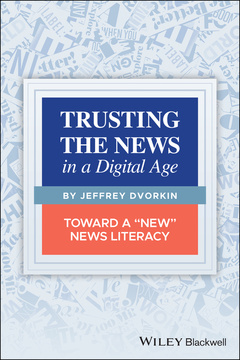Trusting the News in a Digital Age Toward a "New" News Literacy
Auteur : Dvorkin Jeffrey

How to use critical thinking to discern real news from fake news
Trusting the News in a Digital Age provides an ethical framework and the much-needed tools for assessing information produced in our digital age. With the tsunami of information on social media and other venues, many have come to distrust all forms of communication, including the news. This practical text offers guidance on how to use critical thinking, appropriate skepticism, and journalistic curiosity to handle this flow of undifferentiated information.
Designed to encourage critical thinking, each chapter introduces specific content, followed at the end of each section with an ethical dilemma. The ideas presented are based on the author?s experiences as a teacher and public editor/ombudsman at NPR News. Trusting the News in a Digital Age prepares readers to deal with changes to news and information in the digital environment. It brings to light the fact that journalism is about treating the public as citizens first, and consumers of information second. This important text:
- Reveals how to use critical thinking to handle the never-ending flow of information
- Contains ethical dilemmas to help sharpen critical thinking skills
- Explains how to verify sources and spot frauds
- Looks at the economic and technological conditions that facilitated changes in communication
Written for students of journalism and media studies, Trusting the News in the Digital Age offers guidance on how to hone critical thinking skills needed to discern fact from fiction.
1 Introduction to News Literacy 1
2 Changing Definitions of News 15
3 Why Should We Trust the News? Why Now? 31
4 Verification = Trust 46
5 The Effect of Digital on Media Forms 61
6 When the Audience is Biased 76
7 When the News is Biased 89
8 The Economics of Journalism in a Digital Age 100
9 Framing and Deconstructing the News 115
10 News Sources: Credible and Less Credible 128
11 Trusting Journalism in a Time of "Fake News" 140
References 152
Additional Resources 152
Index 154
Jeffrey Dvorkin is a Senior Fellow at Massey College, University of Toronto. From 2011, he was lecturer and director of the journalism program at the University of Toronto Scarborough Campus. He began his career as a CBC journalist in Montreal, Ottawa and Toronto and became Managing Editor and Chief Journalist for CBC Radio in 1991. In 1997, he was named Vice-President, News and Information at NPR in Washington, DC where he subsequently became NPR’s first news ombudsman, handling ethical questions, complaints, and concerns from listeners. Dvorkin has been an advisor and examiner for the Institute of Medical Science at the University of Toronto.
Date de parution : 05-2021
Ouvrage de 176 p.
15x22.6 cm



